Like most things in life, we do best learning through experience, and investing is no different. No matter what, you are going to encounter highs and lows as you invest, since that essentially is the true nature of investing. But it is how you deal with these emotions that will make you a successful investor or not. To the best of your ability, never mix investing and emotions.
Emotions when you first learn to invest are intense. You are new to the game and things can feel overwhelming. Well, it doesn’t get any easier. Even as you become an experienced investors and learn how to trade options, it becomes a whole other set of emotions.
The world’s best investors, Warren Buffett, Ray Dallio, Bill Ackman, who have all delt with the emotional roller coaster of investing.
In fact, let’s take Bill Ackman for a second. He was best known for executing one of the best trades last year where he bet $27 million against the market during the COVID crisis, meaning that if the market went down, his investment would go up. Well, the market crashed pretty significantly in March 2020, and his investment of $27 million became $2.6 billion.
This was an incredible trade. No one told him how to prepare for a market crash, he used logic and reasoning to assume that this type of catalyst was going to severely hamper the market.
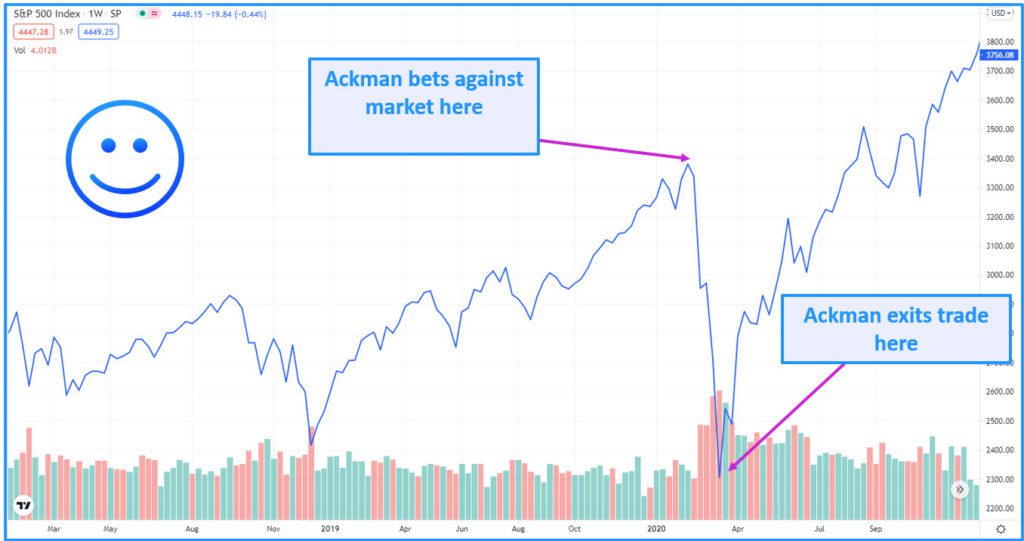
But it wasn’t too long ago that Ackman had one of the most famous failed trades. In 2012, Ackman bet against a popular health supplement company called Herablife, calling it a Pyramid scheme. The stock actually dropped following his position but soon rebounded to all time highs, costing nearly all of his $1billion dollar trade.
He exited the position 5 years later.
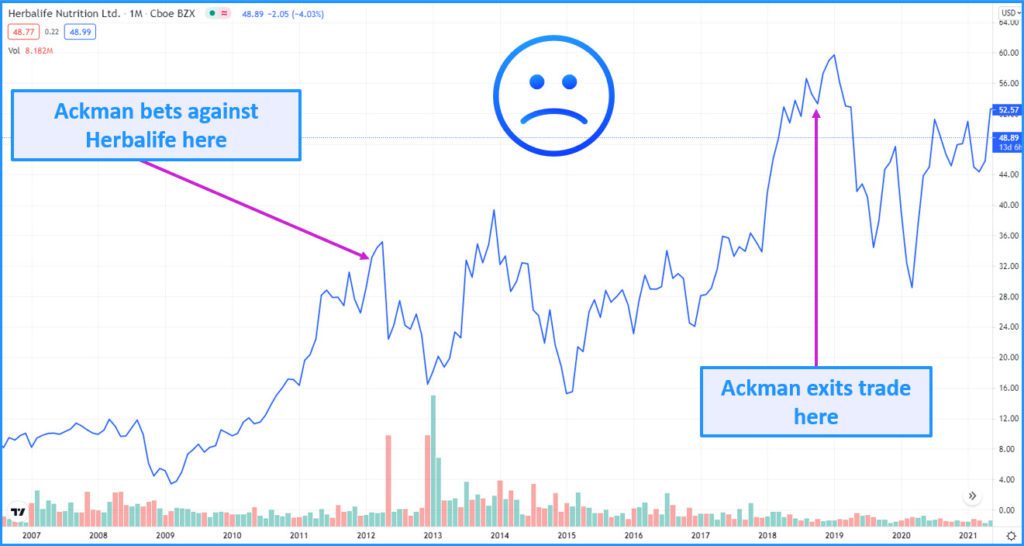
Now, most of you aren’t taking billion-dollar positions against companies after taking this course but the emotions that go with investing are the same amongst major hedge-fund managers and new, individual investors alike.
Look, trying not to be emotional during investing is near impossible.
This is your hard-earned money and is tied to your tireless efforts at work, and often a culmination of self-sacrifice, headaches and stress. So, of course you want it to do well, and have visceral reactions when it doesn’t. And commit now to the idea that there are going to be times when your money doesn’t do well.
It is how we manage these emotions that ultimately prove whether you are going to be a successful investor or not.
And the first thing you have to instill in your investor DNA is this image of the U.S. stock market from the last 50 years.
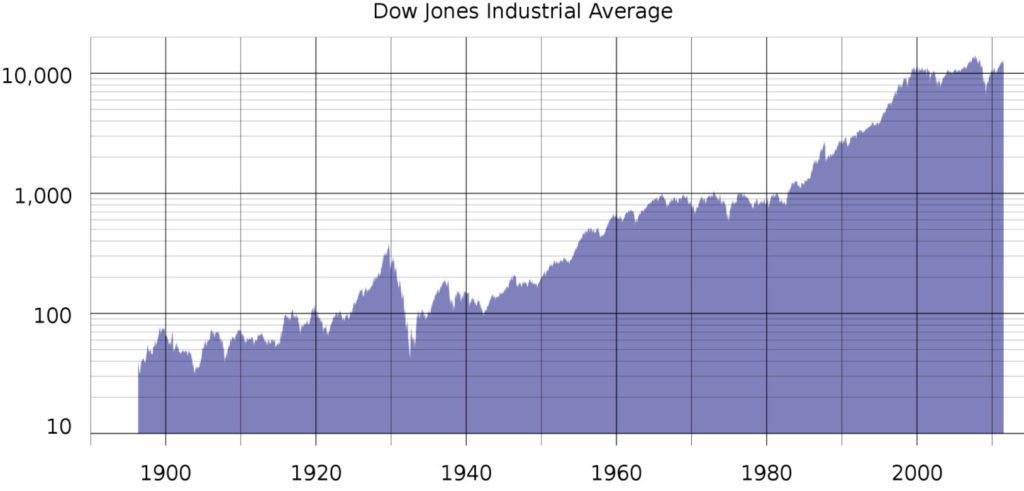
As you can see there are peaks and valleys, but ultimately the valleys are short-lived and the market’s resilience and growth is unmatched against downturn or correction.
So, while those valleys can feel intense, in the long-run, you are going to be successful, if you can properly manage those emotions.
Sounds simple, but it’s not.
Not too long ago, A recent Nobel-prize study by prominent psychologist, Daniel Kahneman, examined the concept of loss vs. gain and the emotional reactions. The study concluded that the pain of a loss is felt twice as intense as the pleasure from a gain.
In the study, which he called “Loss Aversion” where people are more willing to take a risk or behave dishonestly in order to avoid a loss than to make a gain. It’s a fascinating study which ultimately tells us this principle is engrained in our nature.
For those of you who have already invested and experienced a loss, you are probably nodding your heads.
It’s true – When we invest successfully, we feel great. We can glance at our portfolio and see that it is up 1% today, feel good for a moment, and then we move on. However, when the market enters a downturn or even a slight correction and we see that our portfolio is down, that feeling looms over you and doesn’t go away until we see a swing back into positive territory.
If you let emotions drive your decision making, you could end up with a pretty miserable, overall performance. Because, what is the initial reaction we all have when something bad happens? To get away from it as quick as possible, which is why so many new investors fall into the trap of selling at the bottom.
Let’s take a quick look at an example.
I’m taking you back to early 2000’s with a little upstart company called Amazon.
Let’s look at Amazon’s growth over the past couple of decades. One of the most incredible stories of all time.
But let’s focus in on the late 90’s where I circled below
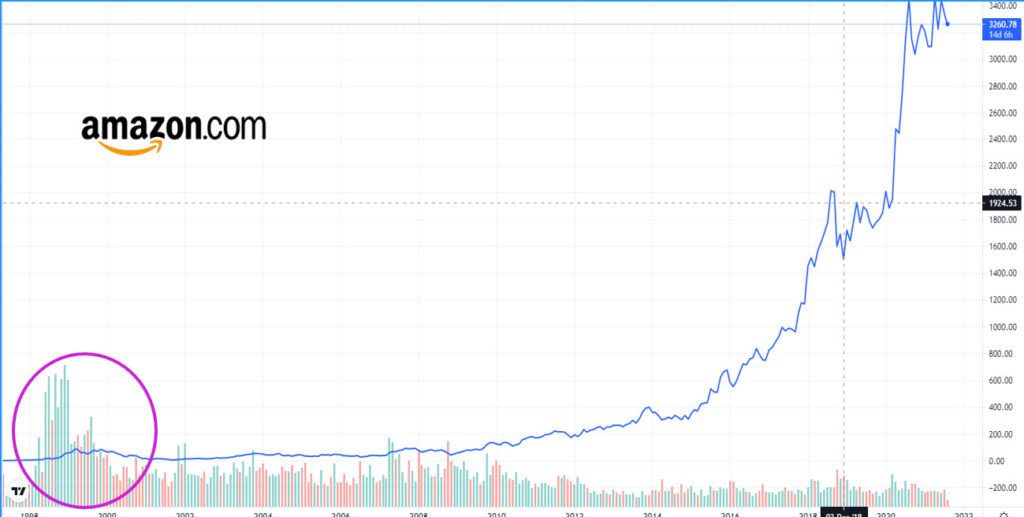
Now, let’s say you purchased $5000 of Amazon Stock right here:
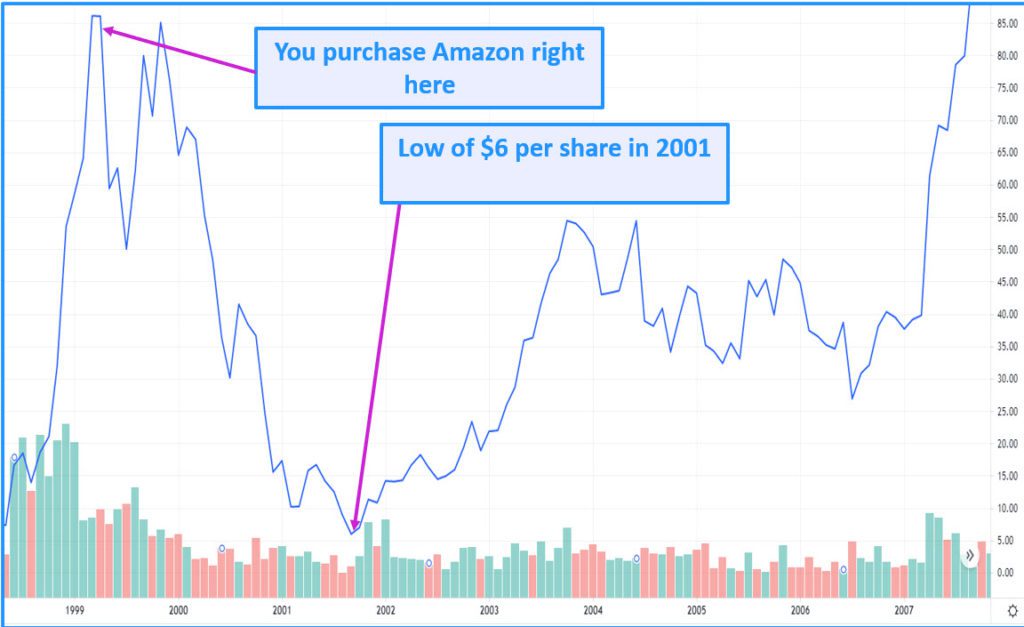
That would be pretty outstanding. You would have purchased 58 shares of Amazon at $87 dollars.
The problem is that everyone was buying Amazon at $87 dollars at the time. In fact, everyone was buying everything that had anything to do with the internet at the time. And this led to what is known as a bubble, more specifically the dot-com bubble.
Buying pressure increased so much at this time due to the excessive speculation and fever surrounding the emergence of internet related companies.
So, if you look at what happened to Amazon, along with many other tech companies, it lost all of its gains and dropped to lows of around $6 per share in late 2001.
This would be devastating as an investor, your $5000 investment would now be worth $348 dollars. Rough.
Many new investors (and there were a lot of them at this time, would have gotten out way before it hit its low around $6. The problem is that many investors let their emotions make their decision for them.
If their temperament was steady and they said, well, I’m just going to ride this out because bubbles burst but the market is resilient, that $5,000 investment would be worth nearly $200,000 today.
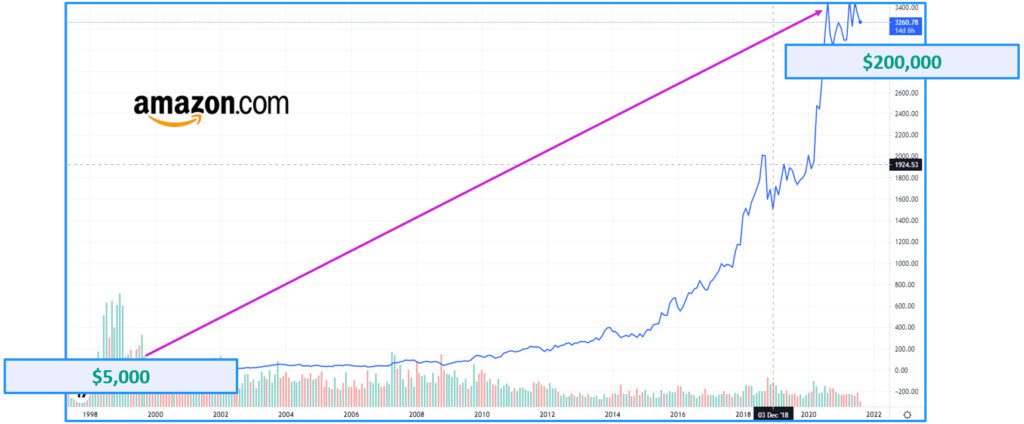
Unfortunately, almost every investor goes through an experience like this.
It’s important to know that you are going to encounter a lot of emotions in investing, but staying true to your risk profile, and always investing with your financial goals in mind, will allow you to create the foundation of a successful investor.